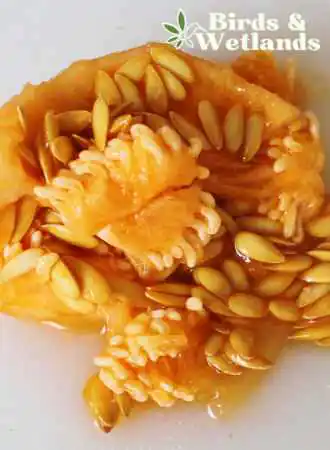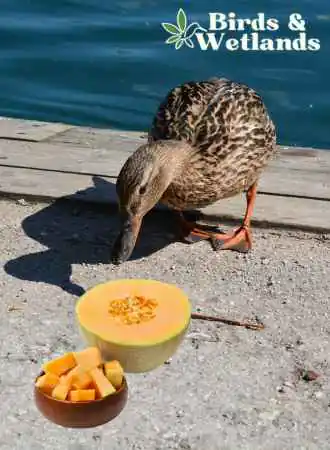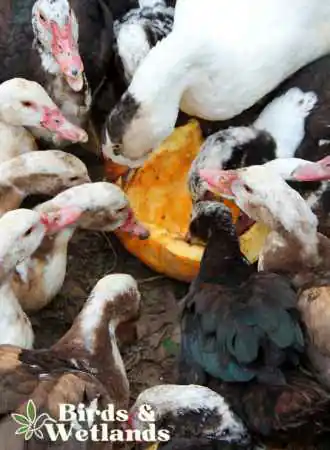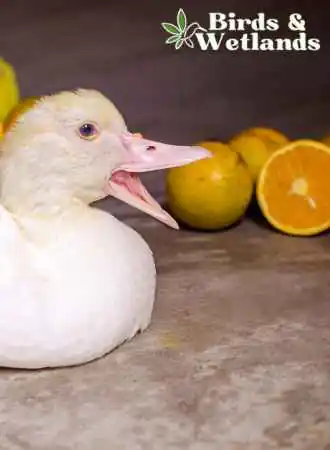Cantaloupe is a refreshing and healthy fruit for humans, but can ducks safely eat it too? In this article, we’ll explore whether feeding cantaloupe to ducks is safe and discuss the potential benefits and risks.
Yes, ducks can eat cantaloupe as an occasional treat. Cantaloupe is a good source of vitamins and minerals, making it a nutritious snack for ducks. Ensure that the cantaloupe is ripe, remove the seeds, and cut it into small, manageable pieces to prevent choking.
Key Takeaways on Feeding Cantaloupe to Ducks
Ducks love cantaloupe because it’s full of water. Feeding this fruit to wild ducks is particularly beneficial to them, especially on a hot summer day.
Introducing cantaloupe to your duck’s diet can be beneficial to your feathered friends. Cantaloupe is full of essential nutrients, antioxidants and minerals. It doesn’t contain too much acid like a citrus fruit which potentially interferes with the duck’s ability to absorb calcium.
When feeding cantaloupes to ducks, make sure the fruit is cut into small pieces to prevent a choking hazard.
What Is a Cantaloupe?

Cantaloupe is a type of melon that is usually round or oval and has a smooth, hard rind. Its sweet, juicy flesh is usually pale orange or yellow. It is also known as rock melon.
Can Ducks Eat Cantaloupe?
If you’re raising ducks, you probably wonder if they can eat cantaloupe. After all, this fruit is known for being watery and full of vitamins. The answer is yes, ducks eat cantaloupe.
Can Baby Ducks Eat Cantaloupe?

Yes, baby ducks or ducklings can eat cantaloupe. However, add this fruit to their diet slowly, like any other food.
Can Ducks Eat Cantaloupe Rind?
Ducks love watermelon rind and pit fruits absolutely make their day. So can they also eat cantaloupe rind?
Yes, ducks can eat cantaloupe rind. However, cantaloupe rind can be tough and hard to chew. If you decided to feed it to your ducks, make sure to cut it into bite-sized pieces.
Can Ducks Eat Cantaloupe Seeds?

Ducks tend to eat seeds, so they can also eat cantaloupe seeds. However, feed roasted cantaloupe seeds to your ducks in moderation. Generally, roasted seeds are prepared with salt and oil, too much of which can irritate ducks’ digestive tracts.
What Are the Health Benefits of Cantaloupe?
Cantaloupe provides good nutritional value to ducks and ducklings. This fruit is high in fiber and water content which promote a healthy digestive system. It also contains vitamins A and C. Vitamin A is essential for good eyesight while Vitamin C boosts the duck’s immune system. The magnesium in cantaloupe helps lower blood pressure.
What Are the Risks of Cantaloupe?

Cantaloupe is a healthy fruit. However, it also contains sugar, albeit lower than other fruits in the same family. So, overfeeding this fruit to your ducks can lead to many health problems, including obesity, diabetes, diarrhea, vomiting and other gastrointestinal issues.
How to Serve Cantaloupe to Ducks

Ducks enjoy and will gladly accept cantaloupe. It’s delicious and full of nutrients. However, you should serve this fruit properly to your ducks. Here are a few tips on how to serve this nutritious fruit to your duck.
If it’s your duck’s first time with cantaloupe, add the fruit to its regular diet gradually.
Remove the skin and seeds of the cantaloupe before feeding it to your ducks.
Chop the cantaloupe into small pieces and put them into your duck feeder.
Serve cantaloupe with other treats such as seeded fruits and chopped grapes. You can also serve it with other veggies such as chopped lettuce.
Avoid feeding moldy cantaloupe which can contain a poisonous substance called mycotoxin which is harmful to ducks and other animals.
Even though cantaloupes are healthy treats, feed them to your ducks in small quantities or in moderation.
Other Similar Foods for Ducks

Best Duck Feed Pellets
Are you a duck owner looking for the perfect feed to keep your feathered friends happy and healthy? Look no further than Purina Duck Feed Pellets! With their nutritionally balanced formula and high-quality ingredients, these pellets are the ultimate solution for providing your ducks with the nutrition they need to thrive.
Pros
- Complete Nutrition: Purina Duck Feed Pellets are nutritionally balanced to provide all the essential vitamins and minerals that ducks need to stay healthy and strong.
- Easy to Digest: The pellets are specially formulated to be easy to digest, which makes them ideal for ducks of all ages.
- Promotes Growth and Development: With its balanced nutrition formula, Purina Duck Feed Pellets are designed to support healthy growth and development in ducks.
- Suitable for All Breeds: Whether you have domestic ducks or wild ducks, Purina Duck Feed Pellets are suitable for all breeds of ducks.
- Trusted Quality: Purina has been producing high-quality animal feed for over 100 years, so you can trust that your ducks are getting the best possible nutrition with Purina Duck Feed Pellets.
Cons
- Cost: Compared to other types of duck feed on the market, Purina Duck Feed Pellets can be slightly more expensive. However, many customers feel that the high-quality ingredients and balanced nutrition formula are worth the extra investment.
- Pellet Size: Some customers have noted that the pellet size of Purina Duck Feed Pellets can be quite large, which may not be suitable for smaller or younger ducks. However, many customers have reported that the pellets can easily be broken up or soaked in water to make them easier to eat.

Jim Addison is an avid bird watcher and has been obsessed with the activity since he was a young boy.
He has traveled all over North America in search of new and interesting species to observe, and his detailed knowledge of the subject makes him a sought-after expert on the topic.



